
It happens in the moments between the noise.
You’re at a holiday dinner, the room is buzzing, and your dad—the family’s master storyteller—is in the middle of a great one. But then he stops. He’s reaching for a word, a simple word he’s used a thousand times, and it’s just… gone. He laughs it off. Everyone does.
A week later, he asks you a question. You answer it. And five minutes later, he asks you the same thing again.
You know that feeling in your gut? The one that whispers, that’s not just a “senior moment,” is it? We’re so quick to brush it off. We don’t want to see it. It’s scary. But those quiet little glitches in conversation, those moments of forgetting, are where the most important story begins.
When we talk about a “10-word conversation,” we’re really talking about two completely different, but deeply connected, things. The first is the clinical one: a surprisingly simple 10-word memory test that doctors use to catch the very first whispers of cognitive change. It’s a quiet, structured chat that can tell you a whole lot about what’s going on under the hood.
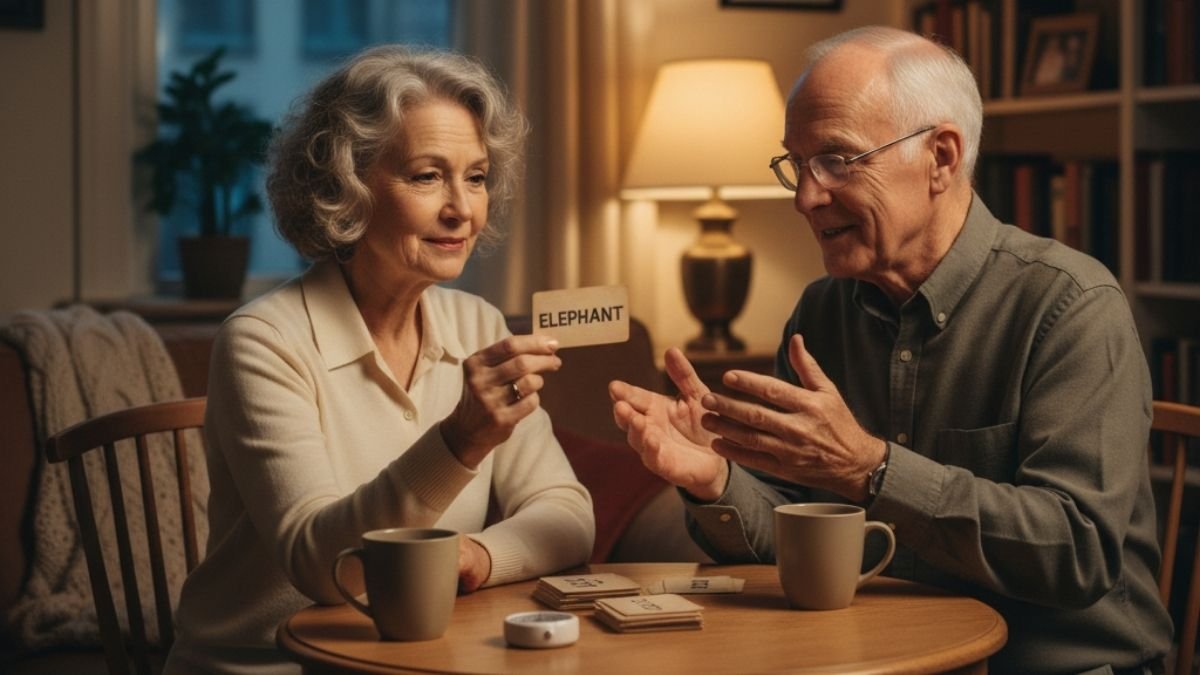
But the second conversation is the truly hard one. It’s the one that happens at the kitchen table. It’s the conversation you need to have with someone you love when you notice these changes. It’s a conversation that can feel impossible to start, but it’s the one that opens the door to getting answers, finding help, and choosing to face the future with a plan instead of with fear.
So let’s talk about both. We’ll break down the science behind that simple test so it’s not so intimidating. We’ll walk through how to have a human conversation with love and courage. Because in a world where over 7 million Americans are living with Alzheimer’s—a number expected to hit nearly 13 million by 2050—the most powerful tool we have is the courage to start talking.
The Doctor’s Conversation — What’s Really Going On With That 10-Word Test?

So, you’ve made the appointment. What now? To understand why a doctor might ask your mom or dad to just remember a few words, we have to step out of the world of casual chats and into the science of how memory works. That “10-word conversation” in a clinic isn’t just a quiz; it’s a precision tool designed to check the health of the brain’s memory systems.
So, What Is This Test, Exactly?
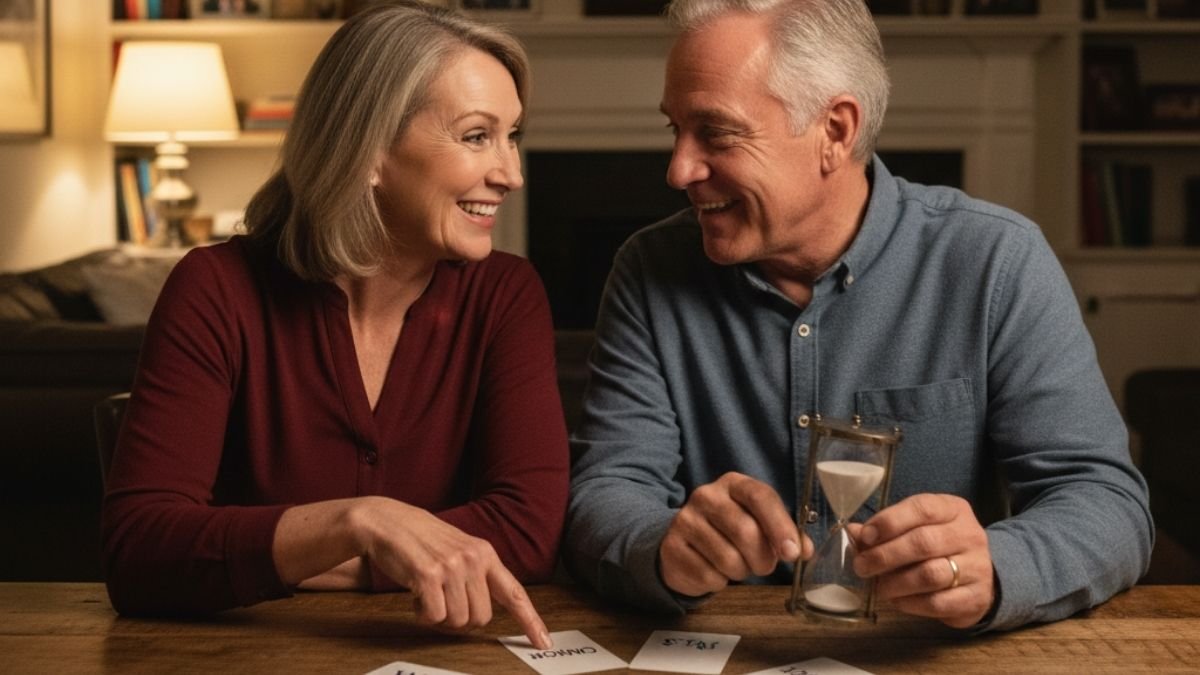
It’s called the ten-word recall test, and it’s a core part of a bigger assessment called the Alzheimer’s Disease Assessment Scale-Cognitive Subscale (or ADAS-Cog for short). Think of it as a quick but powerful check-up for the brain. It’s been proven time and again to be a solid way to spot memory issues early on.
The whole thing is pretty straightforward. A doctor or technician will show someone 10 common, everyday words on cards, one at a time. They’ll ask the person to read each word out loud and try to remember it. This happens in two key parts:
- Right Now Recall (Immediate Recall): As soon as they’ve seen all 10 words, they’re asked to say back as many as they can remember, in any order. They’ll actually do this three times in a row to see how well the brain is learning. This is basically testing the brain’s “scratchpad”—its ability to hold onto new information for a few moments.
- A Little Later Recall (Delayed Recall): After a 5 or 10-minute break filled with other little tasks (like drawing a shape or following a simple command), they’ll be asked to recall those original 10 words again. This is the big one. This tests whether the brain was able to take the information from the scratchpad and file it away into more permanent, long-term storage.
Why a Few Words Can Tell Such a Big Story

Here’s the fascinating part. The doctor isn’t just looking at the final score. They’re looking at the pattern of what was forgotten. This is where the real clues are hiding, and it’s all thanks to something called the serial position effect
It’s a fancy term for a simple idea you’ve experienced your whole life. When you try to remember a list—any list, like a grocery list—you’re most likely to remember the items from the beginning and the very end. The stuff in the middle gets fuzzy. This happens for two reasons :
- The Primacy Effect: You remember the first few words because you had more time to repeat them in your head, helping to lock them into long-term memory.
- The Recency Effect: You remember the last few words because they’re still fresh, bouncing around in your short-term memory “scratchpad.”
Now, here’s the tell-tale sign of the kind of cognitive change we see in Alzheimer’s. People with early Alzheimer’s might still remember the first few words (the primacy effect), but they show a significantly poorer” recency effect.
Think about what that means. Forgetting a word from the middle of a list is normal for almost everyone. But forgetting the word you just heard a few seconds ago? That points to a problem with the brain’s fundamental ability to hold onto new information, even for a moment. It suggests the scratchpad itself isn’t working right. This is a much bigger red flag than forgetting what you had for breakfast last Tuesday. It’s not just about whether someone forgot, but what they forgot.
Spotting the Difference: Normal Aging vs. Something More

Cognitive aging isn’t a switch that flips overnight. It’s a spectrum. It can start with Subjective Cognitive Decline (SCD), which is when you feel like your memory is slipping, but you still ace all the objective tests. From there, about a quarter of people might move into Mild Cognitive Impairment (MCI) over 10 to 15 years.
MCI is that critical in-between stage. It’s when the memory problems become real and measurable on tests, but they’re not bad enough to stop someone from living their daily life independently. And this is where the 10-word test really shines. It’s a simple, quick way to help tell the difference between someone who just feels a bit foggy (SCD) and someone who has a measurable memory issue (MCI).
One study found that if a person recalled about 3 words or fewer, the test was highly effective at identifying those with MCI. It was 87% sensitive (meaning it correctly caught 87% of people who had MCI) and had an overall accuracy rating that was right up there with longer, more complicated tests. Interestingly, your education level can play a role. People with more education might have a slightly higher score even with underlying changes, because their brains have built up a “cognitive reserve”—think of it as having more mental backroads to get to a destination when the main highway is blocked.
Memory Recall Performance 🧠📊
Immediate free recall of a 10-word list across different adult groups.
( ≤ 50 years)
Normal performance for a younger, healthy brain on an immediate recall task. Shows strong memory function.
( > 50 years)
Reflects typical, **mild age-related changes** in memory recall speed and efficiency. Still within a healthy range.
( Impaired)
A **significantly lower score** indicating objective memory impairment, consistent with a dementia diagnosis.
Data from a study comparing immediate free recall performance on a 10-word list test across different groups. Scores represent the mean number of words recalled ± standard deviation.
This table makes it pretty clear. The gap between a healthy older adult remembering five or six words and someone with Alzheimer’s remembering only two or three is huge. And it’s a gap you can find with a simple, quick conversation.
The Human Conversation — How to Talk About It When You’re Scared to Death

Okay, the science is one thing. But honestly? The hardest part is the conversation you have to have at the kitchen table. Seeing these changes in someone you love is deeply unsettling, and the thought of bringing it up can be terrifying. But starting this conversation, with kindness and a bit of a plan, is one of the most loving things you can do.
When Is It Time to Say Something? Normal vs. Uh-Oh

We all lose our keys. We all walk into a room and forget why we’re there. So how do you know when it’s just a normal part of getting older versus something more? The key is whether it’s starting to mess with daily life. The Alzheimer’s Association has a great list of 10 warning signs to watch for.
| Area of Concern | A Typical Age-Related Change | A Potential Sign of Cognitive Decline |
| Memory | Sometimes forgetting names or appointments, but remembering them later. | Trouble following a familiar recipe, difficulty concentrating, and taking much longer to do things than before. |
| Problem-Solving | Making occasional errors when managing finances or household bills. | Getting confused about the day of the week, but figuring it out later. |
| Familiar Tasks | Occasionally needing help to use microwave settings or record a TV show. | Difficulty completing daily tasks like driving to a familiar location or remembering the rules of a favorite game. |
| Time & Place | Sometimes I have trouble finding the right word. | Losing track of dates, seasons, and the passage of time; forgetting where they are or how they got there. |
| Word-Finding | Exhibiting poor judgment with money, paying less attention to personal grooming, and cleanliness. | Trouble following or joining a conversation, stopping mid-sentence, using the wrong name for familiar objects (e.g., calling a watch a “hand-clock”). |
| Misplacing Items | Misplacing things from time to time and being able to retrace steps to find them. | Putting things in unusual places and being unable to retrace steps to find them may lead others to steal. |
| Judgment | Making a bad decision once in a while, like neglecting to change the car’s oil. | Exhibiting poor judgment with money, paying less attention to personal grooming and cleanliness. |
| Social Activity | Sometimes feeling weary of work, family, and social obligations. | Withdrawing from hobbies, social activities, or other engagements due to difficulty following conversations. |
| Mood & Personality | Developing specific ways of doing things and becoming irritable when a routine is disrupted. | Becoming confused, suspicious, depressed, fearful, or anxious; easily upset in unfamiliar situations. |
| This table contrasts typical age-related changes with the 10 warning signs of Alzheimer’s disease and other dementias, providing a practical tool for concerned individuals. |
How to Start the Conversation Without Starting a Fight

Once you see a pattern, it’s time to talk. But you can’t just barge in. Take a breath and think first. Are you the best person for this, or do they have a sibling or a friend they trust more? Have they mentioned it themselves? Is it possible they’re just as scared as you are? A little planning can turn a confrontation into an act of care.
Pick a good time and place—somewhere comfortable and quiet, where you won’t be interrupted. And choose your words carefully. You’re not there to accuse; you’re there to help. Instead of blurting out, “I think you have Alzheimer’s,” focus on specific things you’ve noticed and frame it with love.
You could try something like:
- “Mom, we were worried when you forgot to show up at your grandson’s birthday, and I’d like to talk to you about why that happened because it’s not like you.”.
- “I’ve noticed a few things lately, and because I care about you, I wanted to check in. Have you been feeling any different from usual?”.
Then, the most important part: just listen. They might be angry, scared, or in total denial. Let them feel what they feel, and don’t argue. Keep the conversation positive. Remind them that seeing a doctor is just about getting answers, and that lots of things can cause memory issues—totally treatable things, like a vitamin deficiency, medication side effects, or even depression.
What to Do When They Don’t Want to Talk

It’s really common for people to push back. If they get defensive or deny there’s a problem, don’t force it. Just back off. You can try again another day, or maybe ask another family member to bring it up.
But what if that doesn’t work either? Here’s a strategy that many people don’t know about. You can’t force someone to see a doctor. But you can talk to their doctor yourself. Because of privacy laws like HIPAA, a doctor can’t share a patient’s information with you. But no law says a doctor can’t receive information from you.
You can call or write a letter to their primary care physician. Be specific. Say something like, “I’m calling about my father, [Patient’s Name]. I’m concerned about his memory, and here are a few things I’ve noticed: [list specific examples, like getting lost on a familiar route or forgetting a recent conversation]. I know you can’t talk to me about his health, but I’d be so grateful if you could bring this up with him at his next appointment.”.
This move is brilliant. It takes the pressure off you and puts the concern in a medical context with a trusted professional. The goal shifts from “convincing Mom to go to the doctor” to “giving Mom’s doctor the information they need to give her the best care.” And that’s what this is all about.
Okay, We Talked. Now What? Building a Resilient Brain for Life

Having the conversation isn’t the end of the road. It’s the beginning of a plan. And while the idea of a diagnosis is scary, finding out what’s going on early is an incredibly powerful thing. It gives you and your family control. Even better, science is showing us more and more that we have a say in our brains’ future. A huge chunk of dementia risk is tied to lifestyle choices we can actually change.
The Real Superpower: Knowing Early
It’s easy to think, “If there’s no cure for Alzheimer’s, why even bother getting a diagnosis?” But that misses the point entirely. “No cure” doesn’t mean “no hope” or “nothing to do.” Getting an early and accurate diagnosis is one of the best things that can happen.
Here’s why knowing early is a game-changer:
- You Get a Better Quality of Life: Knowing what you’re dealing with opens the door to treatments that can help manage symptoms, and to support services that make life better for everyone involved. As neurologist Dr. Steven Rapcsak puts it, “Early diagnosis is critical, because treatments and interventions are less effective in the more advanced stages of the disease.”.
- You Can Rule Out Other Things: Sometimes, memory problems are caused by things that are completely reversible, like a vitamin B12 deficiency or a thyroid issue. A diagnosis helps sort that out. It also helps manage other health problems, like diabetes, that can get worse when memory is impaired.
- You Get to Be in Charge of Your Future: An early diagnosis gives you the gift of time. It allows the person with the changes to have a voice in their own future, making legal, financial, and long-term care plans while they still can.
- You Can Help Advance the Science: Knowing early means you can participate in clinical trials for new treatments. This gives you access to cutting-edge care and helps researchers get closer to a cure for future generations.
You Have More Control Than You Think

One of the biggest and most damaging myths out there is that dementia is just a genetic roll of the dice. The truth is, your genes are only part of the story. A major 2020 report from the Lancet Commission found that managing just 12 lifestyle risk factors could prevent or delay up to 40% of dementia cases worldwide. That’s huge. That’s power.
So what are these factors? Think of them in a few buckets:
- Heart and Body Health: Things like high blood pressure in midlife, high “bad” cholesterol, obesity, and uncontrolled Type 2 diabetes are all major risk factors. What’s good for your heart is truly good for your head.
- Lifestyle Choices: This is the stuff you hear about all the time for a reason. Not getting enough physical activity, smoking, and drinking too much alcohol all increase your risk.
- Mind, Senses, and Social Life: We’re now learning that things like untreated hearing loss, depression, and being socially isolated are also significant risks.
- Other Factors: Less education early in life (which means less “cognitive reserve”) and traumatic brain injuries also play a role.
And here’s the kicker: these risks don’t just add up; they seem to multiply. One major analysis found that having just one of these risk factors bumps up your dementia risk. Having two is worse. But having three or more can more than double your risk of developing dementia. This shows that you can’t just focus on one thing. Taking care of your whole self—your body, your mind, your social life—is what gives you the best shot at protecting your brain. The impact is so profound that studies show that middle-aged adults with no major risk factors have the cognitive performance of people 10 to 20 years younger who have multiple risks.
Your Action Plan: Building a “Cognitive Reserve”
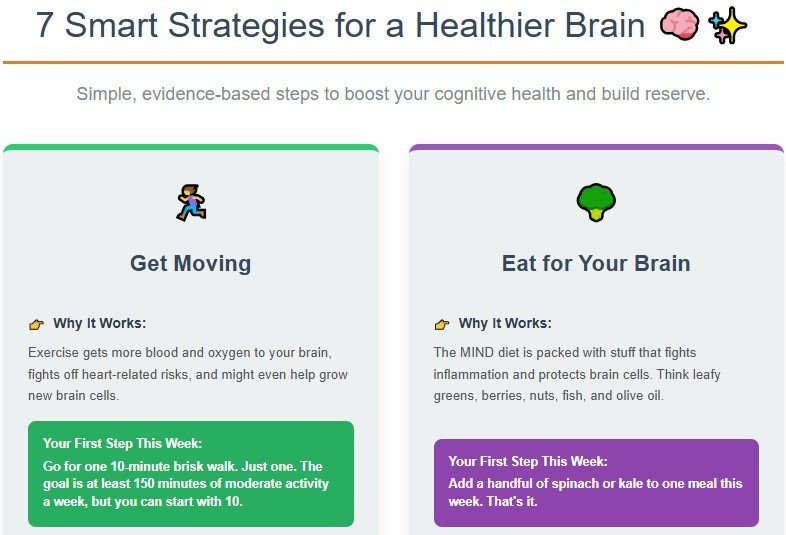
So if you can lower your risk, can you also actively build up your protection? Absolutely. It’s a concept called cognitive reserve. Think of it like a savings account for your brain.
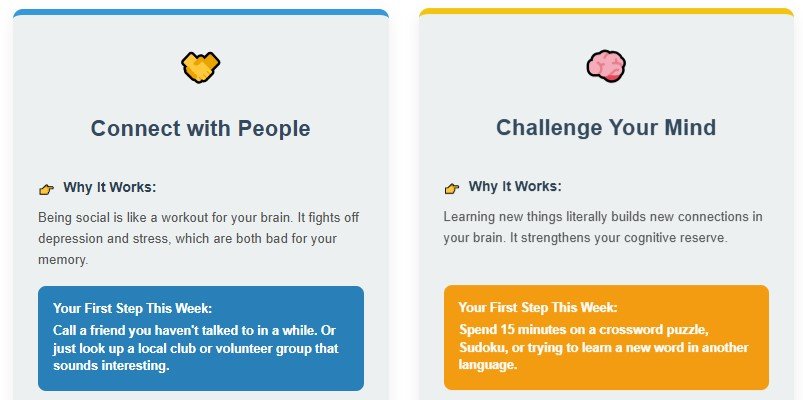
The more you invest in it throughout your life by learning new things and staying active, the more you’ll have to draw on if your brain starts to face challenges later on. It’s the brain’s resilience, its ability to find clever workarounds when its main pathways are damaged.
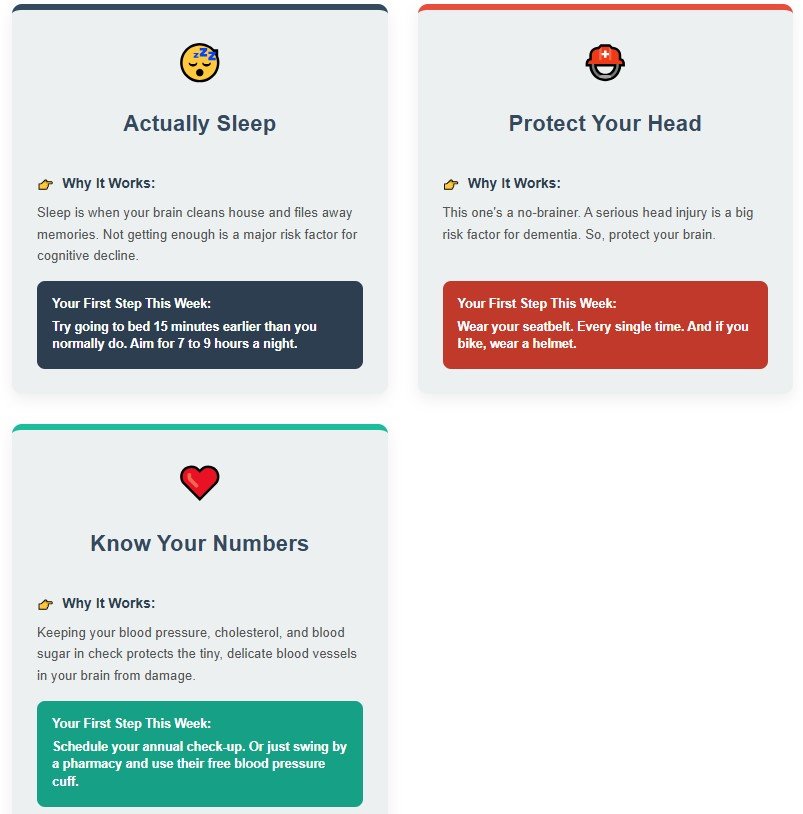
And you can start building it today. Right now.
Need More Help? Look Into These Useful Products
Making big lifestyle changes is the most important thing, but let’s be real—sometimes you just need a little help to make the day-to-day easier. The goal is to reduce stress and frustration, which is always a good thing for brain health. Here are a few practical tools that can make a real difference, either for yourself or for someone you’re caring for.
1. Large Digital Day Clock:

One of the first things to can get confusing is the day and time. A large, high-contrast clock that clearly spells out the day of the week, the date, and whether it’s morning or evening can be incredibly grounding. It removes the guesswork and can reduce a lot of anxiety.
2. Smart Pill Organizer:

Juggling multiple medications is tough for anyone. A smart pill organizer can be a lifesaver. Many can be programmed to send reminders to a smartphone and can even notify a family member if a dose is missed. It’s a simple way to ensure safety and maintain independence.
3. The MIND Diet Cookbook:

We talked about how powerful the MIND diet is for brain health, but figuring out what to cook can feel overwhelming. A good cookbook with simple, delicious recipes makes it so much easier to get started and stick with it. It turns a “diet” into just… dinner.
4. Large-Print Activity Books (Crosswords, Word Searches):

Keeping the mind engaged is key, and you don’t need a fancy computer program to do it. A simple book of large-print crossword puzzles or word searches provides great cognitive stimulation without the frustration of tiny print or complicated rules. It’s a fun, relaxing way to challenge the brain.
5. Dementia-Friendly Jigsaw Puzzles:

Puzzles are fantastic for visuospatial skills, but complex ones can become frustrating. Look for puzzles specifically designed for people with cognitive changes—they often have larger pieces (around 60 pieces is a good start) and come with a picture guide to help with assembly, providing a sense of accomplishment.
Conclusion: It All Starts With a Conversation
The “10-word conversation” is more than just a test. It’s a symbol for the two things we need most as we face the reality of cognitive aging: clarity and courage.
The clinical conversation—that simple word test—gives us clarity. It turns a vague, scary feeling into real, objective information. It helps us see the subtle patterns in how the brain is working, or not working, giving us a heads-up long before life gets turned upside down.
But it’s the human conversation that requires real courage. It’s the one that starts with “I’m worried about you,” and it’s the one that truly opens the door to getting help. The clinical tests tell us what might be happening, but it’s our love and connection that show us how to move forward.
It’s so easy to feel helpless when you hear there’s no cure for a disease like Alzheimer’s. But the science tells us a different story. It tells us that up to 40% of dementia cases may be preventable or delayed. It tells us that our daily choices—to move our bodies, to eat well, to stay connected, to keep learning—build a resilient brain that can better withstand the challenges of aging.
The journey to a healthier brain starts with paying attention. It’s fueled by the courage to have a conversation. And it’s sustained by the small, proactive choices we make every single day. So if you have that feeling in your gut, if you’re worried about yourself or someone you love, don’t wait. The most important conversation you can have about the future of your brain is the one that starts today.






